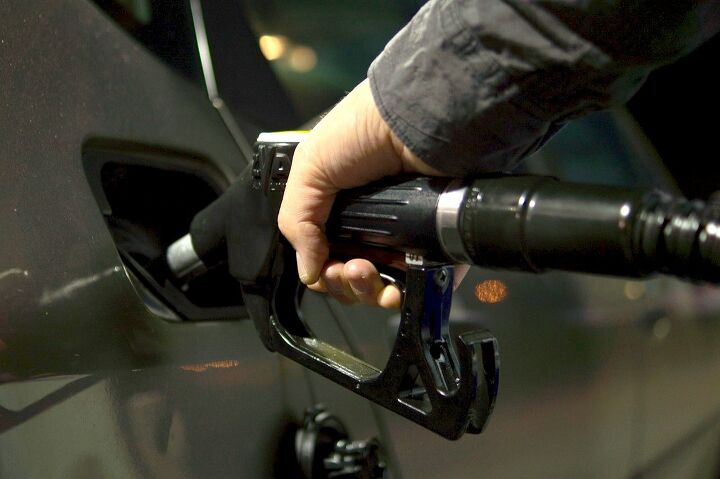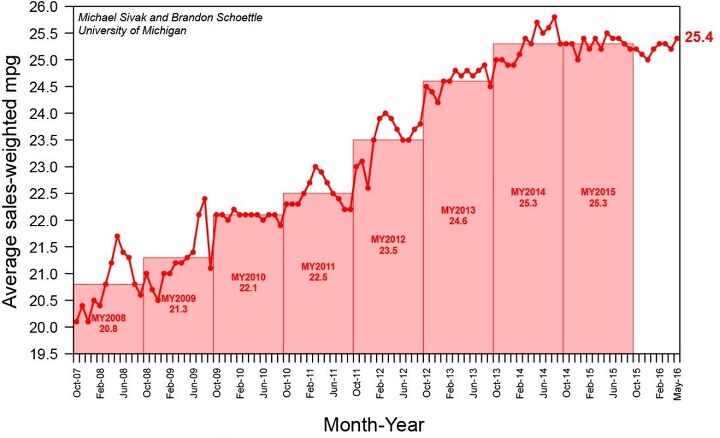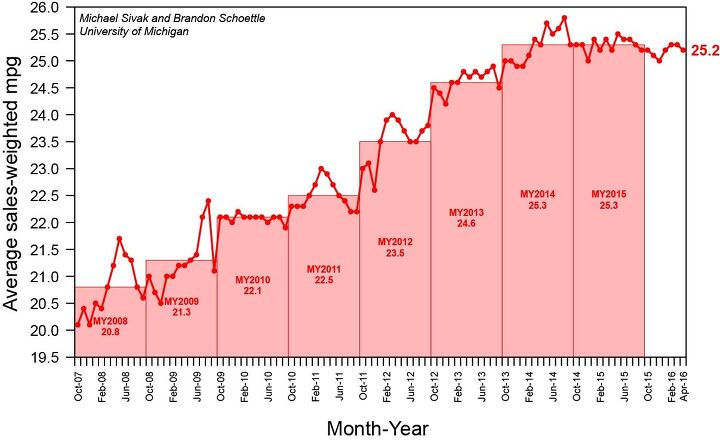#AverageFuelEconomy
Here's Trump's Ace in the Hole for Dialing Back MPG Rules
It’s no secret that the Trump administration will eventually come forward with a relaxed version of existing automotive fuel economy targets. Despite previously agreeing to them, most automakers have decided Obama-era goals are less than ideal and have reached out to the current president to take it easy on them — something he appears willing to do.
However, the White House is going to have to sell the decrease to numerous states that claim they won’t accept such a proposal, as well as a driving public that likely doesn’t want to spend more money on fuel than it has to. Fortunately, the administration has a strategy for this, and has tapped the National Highway Traffic Safety Administration for backup. It’s trying to prove that cutting fuel economy would actually make vehicles safer.
New Vehicles Are More Powerful and Efficient Than Ever, but the Greenest Automaker Only Sells Gas Models: Study
Every year, the Environmental Protection Agency tabulates all available data for new vehicles sold in the United States and prints colorful graphs showing the country’s progress — or in some cases, regression — in key areas of autodom. Areas like average fuel economy, vehicle weight, horsepower, and emissions.
It’s a tradition dating back to the heady, wide-lapelled days of 1975.
The most recent report on light-duty vehicles in the U.S. shows definite, albeit incremental, progress towards many environmental goals. While the auto landscape may not be advancing at the rate preferred by many environmentalists, urbanists, and the Tesla fan base, there’s cause for celebration within the report’s pages. There’s also a special prize in there reserved just for Mazda.
Trump's Updated Fuel Economy Targets Are Coming This March
After what feels like an eternity, the Trump Administration finally feels confident in releasing its alternative to efficiency rules created under former President Barack Obama. The National Highway Traffic Safety Administration will provide the details on the new fuel economy standards for cars and light trucks sometime before the end of March.
This will be followed by partisan arguments as to why it’s the best and worst idea in the world.
Predicting the Pump: How Much Will We Be Paying for Gas in 2018?
Fueling prices and average economy aren’t exactly the sexiest of automotive topics, but they are the two that will probably influence your life the most directly in the coming year. Expensive gas thrusted countless Americans into economy cars during the early 1980s and 2000s, so any advanced warning would be useful to those considering a new vehicle this year.
Last month, crude prices surpassed $60 per barrel after weekly American output dipped and stockpiles fell. That’s the highest they’ve been in over two-years and, with OPEC cutting production and China hungrier for the black stuff than ever before, prices aren’t expected to drop anytime soon. Does that mean you should nix purchasing that big sport utility vehicle you’ve been eyeballing and option the greener alternative?
Won't Get Fueled Again: AAA Testing Suggests Premium Gas, for the Most Part, Isn't Worth Your Cash
Most readers of this site know exactly what an octane rating is and how it relates to the bang it provides in an engine. Hauling up to the pumps and being presented with a choice of everything from 87 to race gas is one of the benefits of living in America.
Higher octane fuel is more expensive than other grades and the gulf between regular and super-duper-extra premium is steadily increasing. Is it worth “treating” your car to a tank of high octane every now and then? The American Automobile Association says absolutely not — and they have the testing to back it up.
U.S. Average Fuel Economy Down in August, Up for End of Summer: Study
The average fuel economy of new cars and light trucks sold within the United States in August was 25.3 mpg, down a very modest 0.1 mpg from July. Based on data plotted by the University of Michigan Transportation Research Institute, that represents an overall increase for the summer months — though it’s been a few years since we’ve seen a meaningful net gain.
Peak efficiency occurred in August of 2014, when fuel economy averaged 25.5 mpg. Since then, it’s been a herky-jerky series of minor rises and falls — ultimately resulting in an annual stagnation. Lower gas prices, combined with a growing preference for crossovers and SUVs, has kept the yearly economy average at 25.1 mpg.
Trump Administration Re-examining Penalties for Fuel Economy Flubs
Automakers’ ability to adhere to the regulatory standards set by the U.S. government are beginning to slip. Manufacturers predicted industry-wide economy inadequacies for 2016 model year vehicles, anticipating things would only worsen for 2017. The Trump administration has framed itself as a friend to automotive companies, with the president himself claiming he would remove regulatory hurdles while in office. Corporate economy guidelines established under President Obama are already under review, but now so are the penalties companies would have to pay for not meeting them.
In a regulatory filing on Friday, the National Highway Traffic Safety Administration said it would be seeking public comment on how to revise plans, slated to go into effect from the 2019 model year, which would more than double the penalties on auto manufacturers that fall short of meeting the government-set economy targets.
Feds Decide to Cut Automakers Some Slack Over Fuel Economy Penalties
Government regulators have heard the auto industry’s plea for clemency pertaining to the United States’ corporate average fuel economy (CAFE).
Responding to a petition from industry groups, the National Highway Traffic Safety Administration is putting the brakes on a planned increase in penalties for not complying with CAFE standards. Automakers won’t have to worry about their 2015, 2016 and 2017 model-year vehicles anymore, as the penalties will now begin with 2019 models.
Average Fuel Economy Rises, So You Know Gas Prices Are Going Up
Drivers aren’t getting the same deal at the pumps as they were last winter, and the gas mileage of new vehicles shows it.
Researchers at the University of Michigan say the average sales-weighted fuel economy of new vehicles hit 25.4 miles per gallon in May, the highest figure so far this year. It’s still less than the all-time high set in August 2014, but it shows not every car buyer is going for the thirstiest vehicle they can afford.
Connect the Dots: Americans Buy More Trucks, Fuel Economy Suffers
On the heels of America’s auto industry growing by over 3% in April 2016, a report from the University of Michigan Transportation Research Institute says the average fuel economy of those vehicles dipped slightly from the month of March.
Given the rise in sales of SUV and trucks, this should surprise no one except amoebas living under a rock.
TTAC News Round-up: America Slams the Brakes on Efficiency, Bonuses at Volkswagen, and Google Hires a Dream Team
Gasoline is gloriously cheap and the automotive industry is taking a break from the tiresome “more mpg” game.
That, Christmas comes early for Volkswagen employees, Carlos Ghosn has a plan to save big bucks, Google is luring more humans and Bentley can’t build enough SUVs for the “you call this caviar?!” crowd … after the break!























Recent Comments